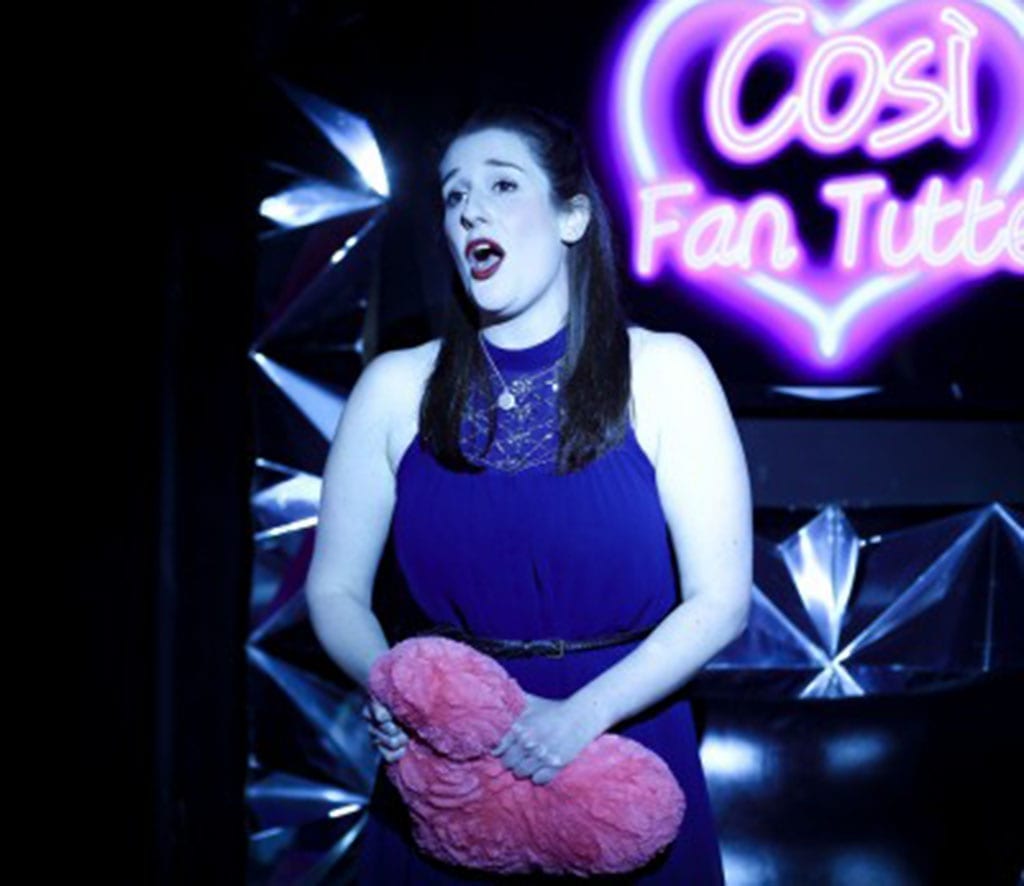Cosi fan Tutte is an opera that is perfect for cutting down to its essentials. The chorus is easily dispensable and the series of solos, duets, and ensembles for the six characters is tailor-made for the intimate opera style that we are so lucky to be able to see in so many small venues in London. This version of Cosi is a brilliant example of the genre and the clever idea of setting it as a TV reality game show really taps into the core themes of the opera – trust, illusion, delusion, lust and fidelity.
Always shadowed by a security guard, Don Alfonso is a game show host running a show that is a cross between Blind Date, Big Brother and Jerry Springer. Some of the opera’s best arias, especially the heart-rending Come Scoglio, beautifully sung by Stephanie Edwards as Fiordiligi, are sung in a ‘diary room’ setting and this device works brilliantly. When the boys pretend to depart for active service their journey is shown on video screens. It also plays with really well with the point that the opera makes so aptly that the relationships between the two sets of lovers at the beginning of the opera are based on romantic nonsense and self- deception. Rest in peace, Cilla Black! This setting does not work for every part of the Mozart/Da Ponte drama – it provides no solution to the problematic false wedding scene – but it provides a context for the central theme that makes enough sense to carry the audience through the more absurd moments in the tale.
There is not a weak link among the cast – the singers are all excellent and pass with flying colours the test of being so close to the audience that no flaw in technique can be hidden upstage. If there is a star performance it is given by Caroline Kennedy as Despina, the game show stage manager, who sings superbly and sharply conveys Despina’s ambivalence about the deception she is helping to manage and about Don Alfonso himself – from her mouth, the aria in which she advises the girls to ‘play the field’ while the boys are away on active service is more about equality than fickleness. Ailsa Mainwaring as the up-for-it Dorabella and Stephanie Edwards as the ambivalent Fiordiligi are both superb and carry off the game show contestant persona with panache. Tenor Laurence Painter and baritone Jevan McAuley are fine singers and make the best of the thankless task of singing in poor disguises for most of the opera. Maybe false moustaches were better made in Mozart’s day.
The simple setting – nothing more than a couple of video screens, a big black chair and some boxes – mean that the action can move along at a pace that enables the story to unfold with speed. Everything about the production suggests a love of Mozart’s masterpiece and a fine appreciation of how it can be effectively stripped down to its essentials. This is the work of director Paul Higgins, whose experience at a number of big opera companies serves the audience very well. The program does not say who is the translator of Da Ponte’s libretto but the colloquial language serves the story-telling well. Any lover of the original will miss the full orchestra but, that apart, this is a really enjoyable evening of witty comedy, superb music and wonderful singing. It’s good to see opera back at the Kings Head.

